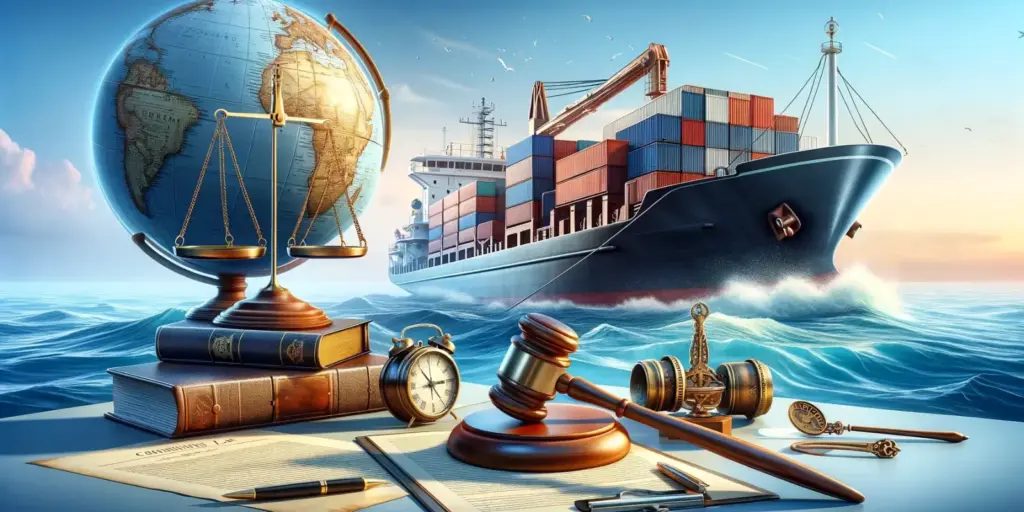Introduction
The vast oceans connect nations, facilitate global trade, and hold immense economic and strategic importance. Maritime Law, a specialized branch of legal studies, governs activities on these waters, ensuring order, safety, and fairness in maritime operations. For those fascinated by the seas and the legal frameworks that regulate them, a career in Maritime Law offers a dynamic and rewarding path. This article explores the intricacies of Maritime Law, guiding you through its definition, career pathways, required skills, and the unique opportunities provided by Aime Connect. Whether you’re a law graduate or an aspiring professional, understanding Maritime Law course can open doors to a world of possibilities. Let’s dive into this exciting field and discover how you can chart your course to success with Aime Connect’s innovative educational support.
Unveiling the World of Maritime Law
Maritime Law, often referred to as Admiralty Law, is a body of laws, conventions, and treaties that regulate private maritime activities, such as shipping, navigation, and commerce, as well as disputes arising on open waters. It encompasses both domestic laws governing maritime activities within a country’s jurisdiction and international laws, such as the Law of the Sea, which regulate global oceanic interactions. From resolving cargo disputes to addressing environmental regulations, Maritime Law ensures the smooth operation of the global shipping industry. It covers diverse areas, including marine insurance, salvage operations, piracy, and contracts for the carriage of goods. By studying Maritime Law, you gain the expertise to navigate complex legal challenges in an industry that drives international trade. This field is particularly significant in countries like India, with its extensive coastline and thriving maritime trade.

Charting Your Path to Becoming a Maritime Law Professional
Becoming a Maritime Law professional requires a structured academic and professional journey. First, you must complete a bachelor’s degree in law, such as an LLB or BA LLB, from a recognized university. Following this, pursuing a Master of Laws (LLM) in Maritime Law is highly recommended, as it provides specialized knowledge in shipping law, admiralty law, and international trade regulations. Many institutions also require candidates to clear entrance exams like CLAT, AILET, or university-specific tests for LLM admissions. Gaining practical experience through internships with shipping companies, law firms, or port authorities is crucial for building expertise. Additionally, obtaining a maritime law certificate or diploma can enhance your credentials. With dedication and the right educational support from platforms like Aime Connect, you can establish yourself as a competent maritime lawyer, ready to tackle global legal challenges.
Essential Skills to Excel in Maritime Law
To thrive in Maritime Law, you need a blend of legal acumen and industry-specific skills. Strong analytical and problem-solving abilities are essential for interpreting complex maritime contracts and resolving disputes. Excellent written and oral communication skills are critical, as you’ll draft legal documents and represent clients in negotiations or courtrooms. A keen understanding of international trade and environmental regulations is vital, given the global nature of the maritime industry. Moreover, adaptability and attention to detail help you stay updated with evolving laws and handle diverse cases, from ship arrests to marine pollution liabilities. Persuasive advocacy, integrity, and the ability to work under pressure are also key traits. By honing these skills, you can confidently navigate the dynamic challenges of Maritime Law and make a significant impact in the field.
Recommended Maritime Law Courses
To build a successful career in Maritime Law, enrolling in specialized courses is essential. Here are some notable programs you can explore:
- LLM in Maritime Law: Offered by prestigious institutions like the National Law School of India University (NLSIU) and NALSAR University of Law, Hyderabad, this two-year postgraduate program covers international maritime law, shipping law, and marine environmental law.
- Diploma in Maritime Laws: A shorter, job-oriented course focusing on practical aspects like maritime contracts and salvage operations, ideal for professionals seeking quick specialization.
- Certificate in Shipping Management: This program emphasizes commercial and legal aspects of shipping, equipping you with industry-relevant knowledge.
- Master of Humanities (M.Hum.) in International Maritime Legislation: A flexible course for professionals, focusing on legislative drafting and international maritime standards.
Aime Connect provides access to tailored resources and guidance to help you choose the right course for your career goals.
Sailing Toward Lucrative Job Opportunities
The scope of Maritime Law is vast, driven by the global demand for maritime trade and logistics. As a maritime lawyer, you can work with ship-owning companies, insurance firms, port authorities, or law firms specializing in maritime disputes. Roles include legal advisors, maritime consultants, or in-house counsel for shipping corporations. You may also find opportunities in government advisory positions or international organizations like the International Maritime Organization (IMO). The rise in international trade and environmental concerns has increased the demand for maritime lawyers, particularly in India, where coastal jurisdictions like Mumbai handle significant legal matters. Salaries are competitive, with junior maritime lawyers earning between INR 6-12 lakhs annually, while experienced professionals can command much higher packages. With Aime Connect’s career support, you can explore these diverse opportunities and secure rewarding placements.
Top Countries for Maritime Law Professionals
Certain countries stand out as prime destinations for Maritime Law professionals due to their robust maritime industries and legal frameworks. The United Kingdom, with its rich maritime history and global shipping hubs like London, offers excellent opportunities in marine insurance and international arbitration. Singapore, a major shipping hub in Asia, is ideal for professionals specializing in trade and logistics law. The United States, particularly cities like Miami and New York, provides access to cruise and cargo industries, with high demand for maritime lawyers. India, with its growing maritime trade and extensive coastline, is emerging as a key player, especially in Mumbai and Chennai. These countries offer competitive salaries, global exposure, and opportunities to work on high-profile cases. Choosing a country depends on your career goals, and Aime Connect’s global network can guide you toward the best fit.
Duration and Delivery: Online or Offline?
The duration of Maritime Law courses varies based on the program. An LLM in Maritime Law typically takes two years, while diploma or certificate courses can range from six months to one year. Full-time programs offer in-depth learning, while part-time or modular courses provide flexibility for working professionals. When choosing between online and offline modes, consider your learning style and schedule. Offline courses, offered by institutions like NALSAR or the University of Southampton, provide hands-on experience and networking opportunities. Online programs, however, offer flexibility, allowing you to study at your own pace from anywhere. Both modes are effective, but online courses suit those balancing work or personal commitments. Aime Connect’s platform supports both formats, ensuring you have access to quality resources and expert guidance, regardless of your choice.
Aime Connect’s Exclusive Features for Your Success
Aime Connect stands out as a premier educational portal, offering tailored support for aspiring Maritime Law professionals. The platform provides personalized career counseling to help you select the right course and career path. You’ll have access to interactive learning materials, including recorded lectures and case studies, designed to deepen your understanding of maritime regulations. Aime Connect also offers mock exams and project assignments to enhance your practical skills, ensuring you’re well-prepared for real-world challenges. Additionally, the portal connects you with industry experts and alumni for mentorship and networking. With lifetime access to resources and a user-friendly interface, Aime Connect empowers you to excel in Maritime Law. Visit https://www.aimeconnect.com to explore these features and start your journey today.
Conclusion
Maritime Law is a gateway to a dynamic and impactful career, blending legal expertise with the global maritime industry. By pursuing specialized courses and developing key skills, you can navigate the complexities of this field and secure rewarding opportunities worldwide. Countries like the UK, Singapore, and India offer fertile ground for maritime lawyers, while Aime Connect’s innovative features ensure you’re equipped for success. Whether you choose online or offline learning, the right guidance can make all the difference. Take the first step toward your maritime law career with Aime Connect’s comprehensive support. Thank you for exploring this exciting field with us. Signup and enjoy free special features from Aime Education Portal—login to our portal: https://www.aimeconnect.com.



